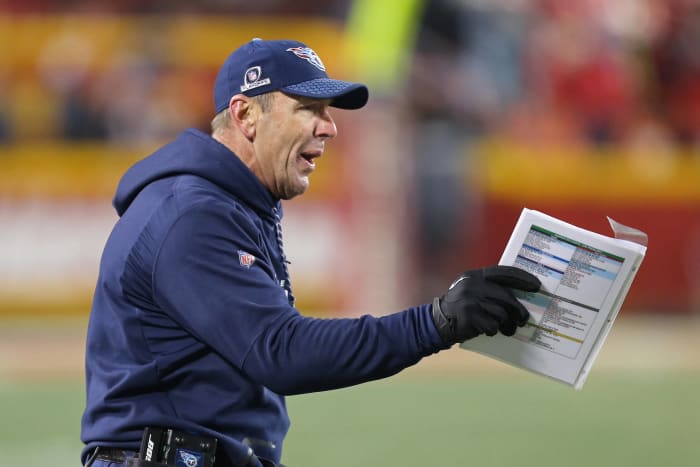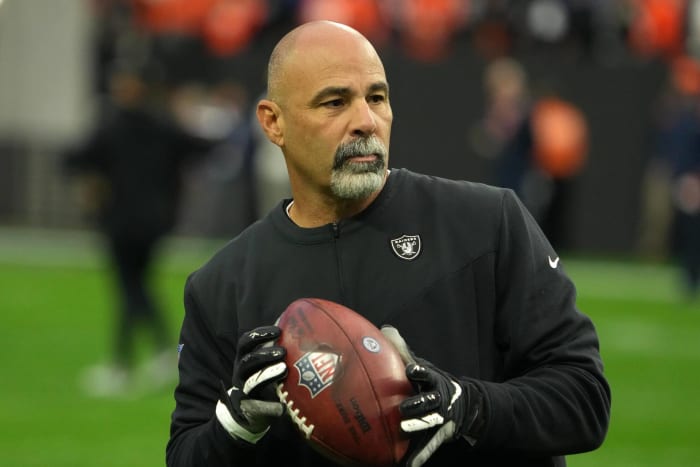
NFL teams to change coaches after a playoff berth
While not uncommon, a number of NFL clubs have changed coaches after making the playoffs. Here are the teams that have made post-playoff changes since the 1970 merger, including retirements, resignations, and firings.

Bruce Arians stayed in place as Buccaneers brass met at the 2022 Scouting Combine and during the early stages of free agency. Arians was still there to make decisions, implying that the Bucs would not deal the then-retired Tom Brady’s rights to another team. Weeks later, Brady returned, and everything changed. Arians has often maintained that Brady effectively forced him out, resulting in the team elevating Todd Bowles and shifting Byron Leftwich to play-calling duties. Arians’ departure was significant. The Bucs, who finished 12-5 in 2021, struggled through an 8-9 season full with Brady-related headlines. Arians remained with the Bucs in an unnamed advisory capacity.
Mark Davis’ sorrow over passing on Bisaccia, the special teams coordinator elevated to succeed Jon Gruden as interim head coach in October 2021, influenced the owner’s decision to promote his most recent interim leader (Antonio Pierce) to full-time status. Rich Bisaccia, whom the Raiders passed over in favor of Josh McDaniels, aided a Raiders squad that lost first-round picks Henry Ruggs and Damon Arnette due to off-field issues. Bisaccia, a 2018 Gruden hiring as special teams coach, led the Raiders to a 7-5 record and their first postseason appearance since 2016. Despite almost upsetting the eventual AFC champion Bengals, the Raiders reversed course. This brought Bisaccia to Green Bay.

The Titans are the most recent team to remove a coach after he led a playoff run. In January 2018, there was a 180-degree turnaround. Following a 9-7 regular season, ownership assured Mike Mularkey that he would be returning. The Titans then defeated a depleted Chiefs club — in Alex Smith’s final game as Kansas City’s starter — in the wild-card round, their first playoff victory since 2003. Tennessee lost a one-sided divisional round game at New England, and ownership quickly dismissed Mularkey after granting him an extension. The Titans promoted Mularkey from interim head coach in 2015 and granted him only two seasons, during which he went 9-7. Mike Vrabel took over several weeks later.

Rumors linking John Fox to the Bears’ head coaching position appeared before to the Broncos’ divisional-round game against the Colts. Fox had guided the Broncos to four consecutive postseason appearances, initially approving an offensive revamp to compensate for Tim Tebow’s deficiencies. The next three years saw Peyton Manning, whose towering presence overshadowed Fox. During the Fox-Manning era, the Broncos lost two divisional-round home games. The first came when Denver’s defense allowed the Ravens 38 points. The second was plenty for GM John Elway. The Broncos left Fox after a 24-13 loss to the Colts. Following Fox’s departure for Chicago, Denver won Super Bowl 50 under Gary Kubiak.

Despite failing to lead the Buccaneers to the Super Bowl (after altering the franchise’s fortunes in the 1990s), Tony Dungy helped the Colts in the 2000s. Indianapolis set a record with seven consecutive 12-plus-win seasons (2003-09), with six coming under Dungy, who led the 2006 squad to the Super Bowl XLI title. Dungy did so after his teenage son died shortly before the 2005 playoffs. Following the 2008 season, which concluded with an overtime loss to the 8-8 Chargers, Dungy notified Jim Irsay that he was retiring. This triggered the Colts’ succession plan, which promoted quarterback coach Jim Caldwell. Indy made it to Super Bowl XLIV the following season.






